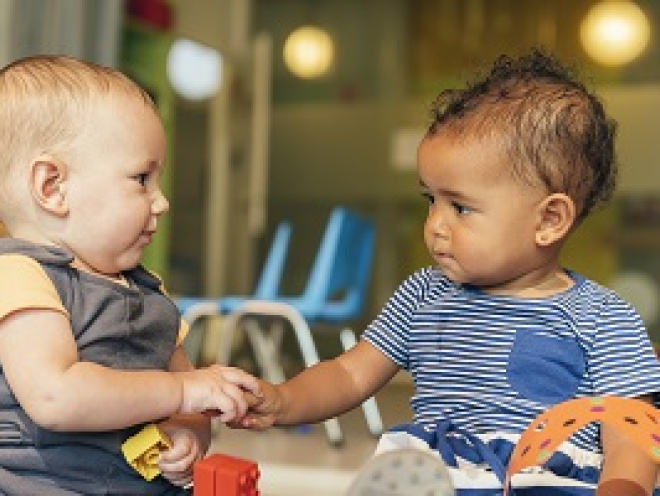Why Is It Important To Interact With Infants?
Why Is It Important To Interact With Infants? In the early stages of life, every interaction and experience shape an infant’s cognitive, emotional, and social development. As caregivers and educators, our role in fostering healthy growth and learning for infants in daycare or school environments is paramount. Interacting with infants goes beyond simple caregiving tasks; it involves engaging with them in meaningful ways that support their overall well-being and development. In this blog post, we’ll delve into the importance of interacting with infants in daycare or school settings and explore the profound impact it has on their early years.
PRO TIP: Check out Monarch Montessori’s programs for kindergarten program, primary education, and toddler students. They help kids learn and grow in different ways. Don’t miss their Summer Camp and Infant Daycare in NJ for more fun and learning!
Building Trust and Attachment
Interacting with infants forms the foundation of trust and attachment between caregivers and children. When infants receive responsive and nurturing care, they develop a sense of security and confidence in their caregivers, which is essential for healthy emotional development. Through gentle touch, soothing words, and attentive responses to their needs, caregivers establish a secure attachment bond that lays the groundwork for positive relationships and emotional resilience later in life.
Stimulating Cognitive Development
Infancy is a period of rapid brain development, with neurons forming new connections at an astonishing rate. Interacting with infants in stimulating ways provides valuable sensory experiences that promote cognitive development. Activities such as talking, singing, reading, and playing with age-appropriate toys help infants explore their environment, develop language skills, and enhance their cognitive abilities. By engaging in interactive experiences, caregivers stimulate infants’ curiosity and foster a love for learning from an early age.
Supporting Language Acquisition
Language development begins in infancy, with infants eagerly absorbing the sounds, rhythms, and patterns of speech in their environment. Interacting with infants through conversation, storytelling, and singing not only exposes them to language but also encourages vocalization and communication skills. Caregivers can model language, respond to infants’ babbling, and engage in reciprocal exchanges to support the development of expressive and receptive language abilities.

Encouraging Social Interaction
Even in the earliest months of life, infants demonstrate a natural inclination towards social interaction and connection with others. Interacting with infants in daycare or school settings provides opportunities for social engagement and peer interaction, which are essential for developing social skills and emotional intelligence. Through simple games, turn-taking activities, and group interactions, caregivers facilitate meaningful social experiences that lay the groundwork for positive relationships and cooperation in later years.
Fostering Emotional Regulation
Infants rely on caregivers to help them regulate their emotions and navigate the ups and downs of daily life. Interacting with infants in responsive and sensitive ways teaches them to recognize and express their emotions, as well as cope with stress and frustration. By providing comfort, reassurance, and validation of their feelings, caregivers support infants’ emotional development and lay the groundwork for healthy self-regulation skills.
Promoting Physical Development
Interacting with infants involves supporting their physical development through activities that encourage movement, exploration, and sensory experiences. Caregivers can provide opportunities for tummy time, crawling, reaching, and grasping, as well as introduce age-appropriate toys and objects that stimulate fine and gross motor skills. Through interactive play and movement activities, caregivers help infants develop strength, coordination, and spatial awareness.
Why Is It Important To Interact With Infants?
Interacting with infants in daycare or school settings is essential for nurturing their holistic development and laying the foundation for lifelong learning and well-being. From building trust and attachment to stimulating cognitive development, supporting language acquisition, and fostering social interaction, the interactions infants have with caregivers shape their early experiences and lay the groundwork for future growth and success. As caregivers and educators, it is our responsibility to provide infants with responsive, nurturing, and enriching experiences that support their physical, cognitive, emotional, and social development during this critical period of life. By prioritizing meaningful interactions with infants, we empower them to thrive and reach their full potential in the years to come. Contact Monarch Montessori School in New Jersey for any questions about our infant program!
Our Location
We are located at 2 Newark Pompton Turnpike, Little Falls, NJ 07424.



